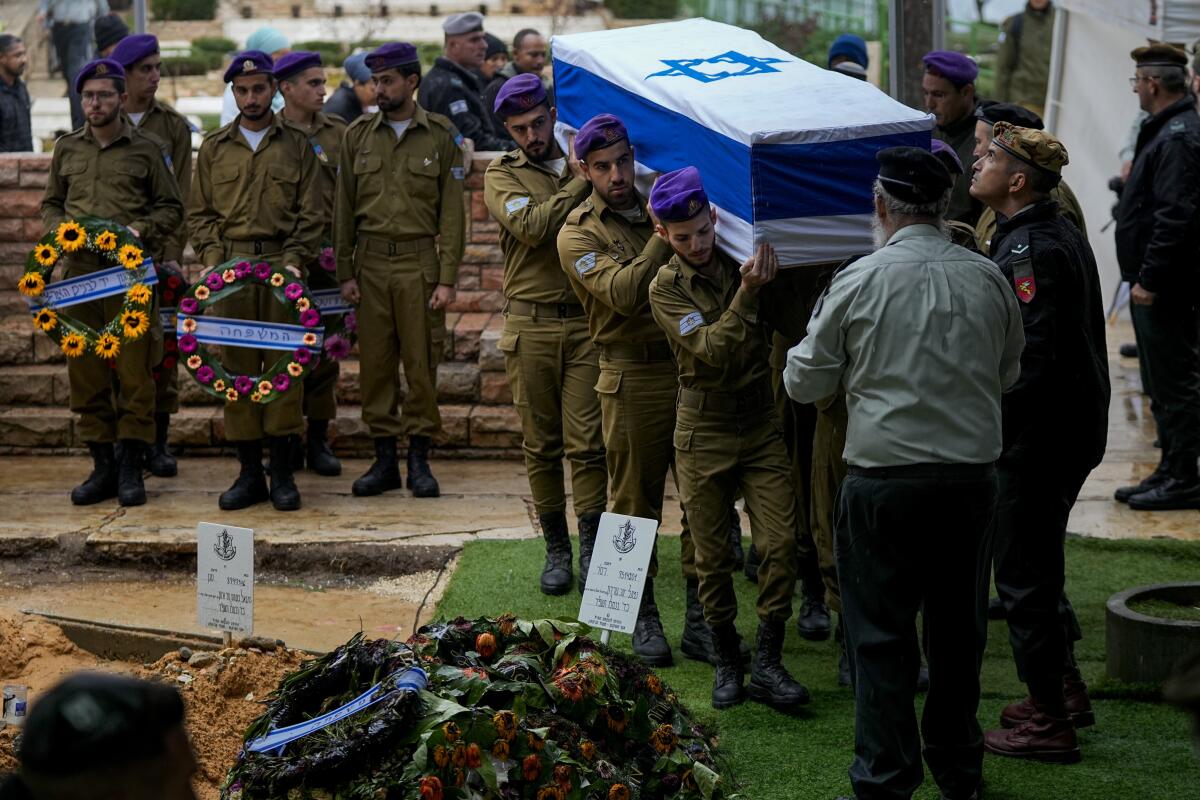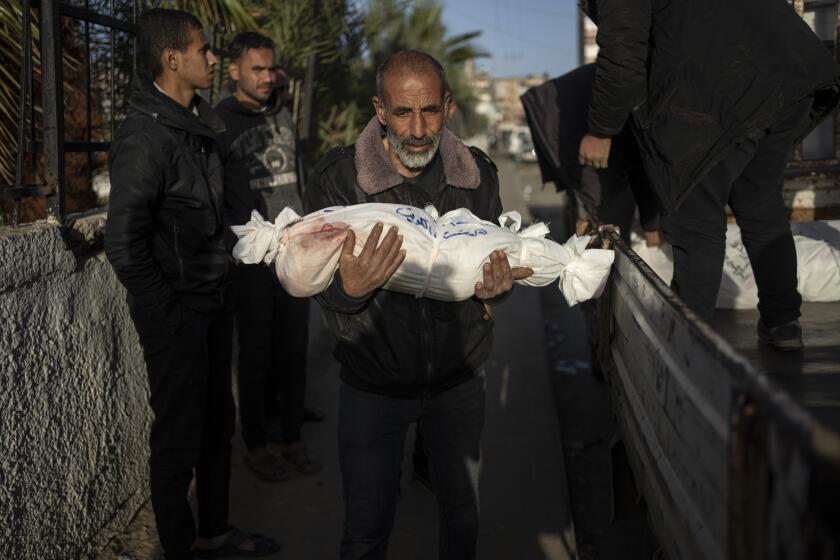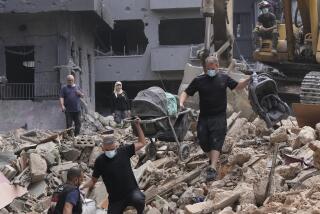Residents of Palestinian refugee camp, Israeli soldiers killed in Gaza as fighting continues

TEL AVIV — At least 68 people were killed by an Israeli strike on a refugee camp, Gaza health officials said Sunday, while the number of Israeli soldiers killed in combat over the weekend reached 15.
Following the strike on the Maghazi refugee camp east of Deir al Balah, Associated Press journalists watched frantic Palestinians carry the dead, including a baby, and the wounded to a nearby hospital. One bloodied young girl looked stunned while her body was checked for broken bones.
The fatalities included at least 12 women and seven children, according to early hospital figures.
“We were all targeted,” said Ahmad Turokmani, who lost several family members, including his daughter and grandson. “There is no safe place in Gaza anyway.”
Earlier, the Health Ministry in Gaza reported the death toll at 70. The Israeli military had no immediate comment.
Among Israeli troops, the death toll stands at 154 in the ground offensive of the war ignited when Hamas-led militants stormed communities in southern Israel on Oct. 7, killing at least 1,200 people, mostly civilians, and taking 240 hostages.
Israel’s air and ground response has devastated parts of Gaza, left roughly 20,400 Palestinians dead and displaced almost all of the territory’s 2.3 million people.
Paths for ‘unhindered’ aid to Gaza were approved in a rare U.S. abstention at the U.N., but there is still no agreement on a cease-fire.
Israel continues to stand behind its goals of crushing Hamas’ governing and military capabilities and releasing the remaining 129 captives. That support has remained largely steady despite rising international pressure for a cease-fire.
As Christmas Eve fell, smoke rose over Gaza from the fighting, while Bethlehem in the West Bank was hushed, its holiday celebrations called off.
At least 14 of the Israeli soldiers died since Friday in central and southern Gaza, a sign of how Hamas is continuing to put up tough resistance, even as Israel says it is dealing the militant group a serious blow.
“The war exacts a very heavy price from us, but we have no choice but to continue fighting,” Israeli Prime Minister Benjamin Netanyahu told a Cabinet meeting.
In a nationally televised speech, Israeli President Isaac Herzog appealed for the country to remain united. “This moment is a test. We will not break nor blink,” he said.
There has been widespread anger against Netanyahu’s government, which many in Israel criticize for failing to protect civilians on Oct. 7 and promoting policies that allowed Hamas to gain strength over the years. Netanyahu has declined to accept responsibility for military and policy failures.
“Over time, the public will find it hard to ignore the heavy price paid, as well as the suspicion that the aims that were loudly heralded are still far from being attained, and that Hamas is showing no signs of capitulating in the near future,” wrote Amos Harel, military affairs commentator for the Haaretz newspaper.
The Israeli military said it had completed the dismantling of Hamas’ underground headquarters in northern Gaza, part of an operation to take down the vast tunnel network and kill top commanders that could take months, leaders say.
On Sunday, Ziyad Nakhalah, head of the Palestinian Islamic Jihad group, which was also involved in the Oct. 7 attacks, arrived in Cairo for talks on a possible round of hostage releases. The militant group said it was prepared to consider releasing hostages only after an end to the fighting. Hamas leader Ismail Haniyeh traveled to Cairo for talks days earlier.
Israel’s offensive has been one of the most devastating military campaigns in recent history. More than two-thirds of the 20,000 Palestinians killed have been women and children, according to the Health Ministry in Gaza, which does not differentiate between civilians and combatants.
The Palestinian Red Crescent said a 13-year-old boy was shot and killed in an Israeli drone attack while inside al-Amal Hospital in Khan Yunis, a part of Gaza where Israel’s military believes Hamas leaders are hiding.
An Israeli strike overnight hit a house in a refugee camp west of the city of Rafah, on Gaza’s border with Egypt. At least two men were killed, according to AP journalists in the hospital where the bodies were taken.
At least two people were killed and six wounded when a missile struck a building in the Bureij refugee camp in central Gaza.
Palestinians reported heavy Israeli bombardment and gunfire in Jabaliya, an area with a refugee camp north of Gaza City, which Israel had claimed to control. Hamas’ military arm said its fighters shelled Israeli troops in Jabaliya.
“Sounds of explosions and gunfire never stopped,” said Jabaliya resident Assad Radwan.
Israel has launched thousands of airstrikes since Oct. 7 and has refrained from commenting on specific attacks.
Israel, which has come under international criticism for the Palestinian civilian death toll, also faces allegations of mistreating Palestinian men and teenage boys detained in homes, shelters, hospitals and elsewhere during the offensive. It has denied abuse allegations and said detainees without links to militants are quickly released.
Speaking to the AP from a hospital bed in Rafah after his release, Khamis Burdainy of Gaza City said Israeli forces detained him after tanks and bulldozers partly destroyed his home. He said men were handcuffed and blindfolded.
“We didn’t sleep. We didn’t get food and water,” he said, crying and covering his face.
Another released detainee, Mohammed Salem, from the Gaza City neighborhood of Shijaiyah, said Israeli troops beat them.
“We were humiliated,” he said. “A female soldier would come and beat an old man, aged 72 years old.”
The United Nations Security Council has passed a resolution calling for the speedy delivery of humanitarian aid for hungry and desperate Palestinians and the release of all hostages, but not for a cease-fire.
It was not immediately clear how and when deliveries of food, medical supplies and other aid would accelerate. Trucks enter through two crossings: Rafah and Kerem Shalom, on the border with Israel. Wael Abu Omar, a spokesman for the Palestinian Crossings Authority, said 123 aid trucks entered Gaza on Sunday, versus a daily average of 500 before the war.
The head of the World Health Organization, Tedros Adhanom Ghebreyesus, reiterated U.N. calls for a humanitarian cease-fire, adding on social media that “the decimation of the Gaza health system is a tragedy.”
Israel’s allies in Europe have stepped up calls for a halt to the fighting. But its top ally, the U.S., appears to remain firmly behind Israel despite intensifying its calls for greater protection for civilians.
President Biden spoke with Netanyahu on Saturday, a day after Washington shielded Israel from a more forceful U.N. resolution. Biden said he did not ask for a cease-fire, while Netanyahu’s office said the prime minister “made clear that Israel would continue the war until achieving all its goals.”
Amid concerns about a wider regional conflict, the U.S. Central Command said a patrol ship in the Red Sea on Saturday shot down four drones launched from Houthi-controlled areas in Yemen, while two Houthi anti-ship ballistic missiles were fired into international shipping lanes.
The Iran-backed Houthis say their attacks are aimed at Israel-linked ships in an effort to stop the offensive in Gaza.
More to Read
Sign up for Essential California
The most important California stories and recommendations in your inbox every morning.
You may occasionally receive promotional content from the Los Angeles Times.











